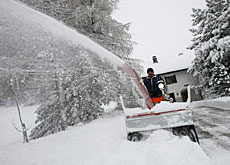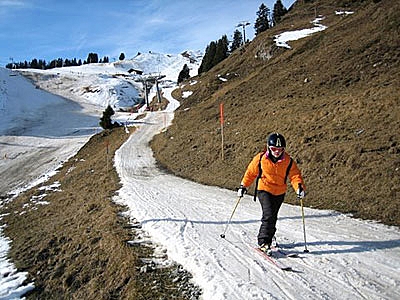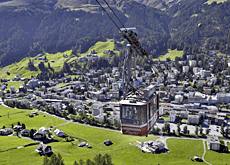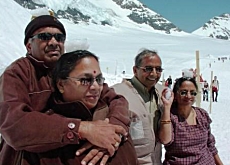Snowiest start to winter in 55 years

Up to 120 centimetres of snow has fallen on the Swiss Alps since Friday, the largest amount at the start of winter for over five decades – and more is expected.
Tourism authorities in ski resorts are rubbing their hands, not only because of the low temperatures but also in expectation of a record season.
The southeastern resort of Davos in eastern Switzerland, which lies at 1,560m, saw 62cm of snow fall within 24 hours, according to the national weather service MeteoSwiss on Sunday morning.
St Antönien, also in canton Graubünden, reported 64cm and Braunwald in the neighbouring canton of Glarus saw 72cm, the same amount as Unteriberg in canton Schwyz.
The last time so much snow fell in November was in 1952, but what is also unusual about the current weather conditions is that the stormy northwest wind is carrying relatively large amounts of snow down south, for example to the upper Engadine valley.
According to the federal institute for snow and avalanche research in Davos, the level of snow above 1,500m has reached 120cm since the snow began to fall.
The areas hit most were the northern slopes east of the Susten pass, the resort of Samnaun, the Silvretta mountain range and northern Graubünden.
Experts warned on Saturday of a significant danger of avalanches in the areas and raised the warning to its second highest level.
However, no one had been caught up in an avalanche and there was no major damage, according to police, who said few people were currently on the slopes. On Sunday evening the warning level was lowered to “considerable”.
On Monday morning, however, Viasuisse, a traffic information provider, warned of snow-covered roads above 600m – including northbound access routes to the Gotthard and San Bernardino tunnels – and it said 14 passes were closed.
Tourism bonus
Those in the tourism business were delighted by the unusually early and heavy snowfall.
They are hoping this winter will see the number of overnight stays and skipasses sold make up for the disappointing previous winter season, which ended up being the warmest on record.
In Graubünden, Switzerland’s largest tourist region, many ski resorts are planning on beginning the winter season a week early and are currently busy bashing the pistes.
Resorts in the Bernese Oberland are also looking forward to a better start to the season.
Eduardo Zwyssig from the Gstaad-Saanenland tourism office is hoping the first ski areas will open on December 1.
Gieri Spescha, spokesman for Graubünden tourism, said: “The important thing now is for people in lower parts of the country to notice that winter has arrived.”
Hard winter?
What’s more, the winter conditions are set to continue. MeteoSwiss expected 15-30cm of snow to fall at the beginning of the week and predicted that it would even make it down to lower altitudes.
If the weather proverb connected to St Martin’s Day – which on November 11 commemorates the 4th-century Bishop of Tours – is to be believed, we’re in for a hard winter: “If Martin’s beard is white, a long cold winter will bite.”
Only the southern canton of Ticino can expect milder weather in the coming weeks, with temperatures rising to 13 degrees thanks to the north Föhn wind.
swissinfo with agencies
Warmest location: Locarno-Monti 11.5°C (annual average)
Highest temperature: Grono (GR) 41.5°C August 11, 2003.
Coldest location: Jungfraujoch -7.9°C (annual average).
Coldest temperature: La Brévine -41.8°C January 12, 1987.
Highest rainfall in one day: Camedo TI, 414mm September 10, 1983.
Highest rainfall in one year: Mönchsgrat 5,910mm, 1939/40.
Driest location: Ackersand VS 521mm (annual average).
Longest dry period: Lugano 77 days (from December 6, 1988).
Highest new snowfall (per day): Klosters 130cm January 29/30, 1982.
Highest snow amount: Säntis 816cm April 1999.

In compliance with the JTI standards
More: SWI swissinfo.ch certified by the Journalism Trust Initiative



You can find an overview of ongoing debates with our journalists here . Please join us!
If you want to start a conversation about a topic raised in this article or want to report factual errors, email us at english@swissinfo.ch.